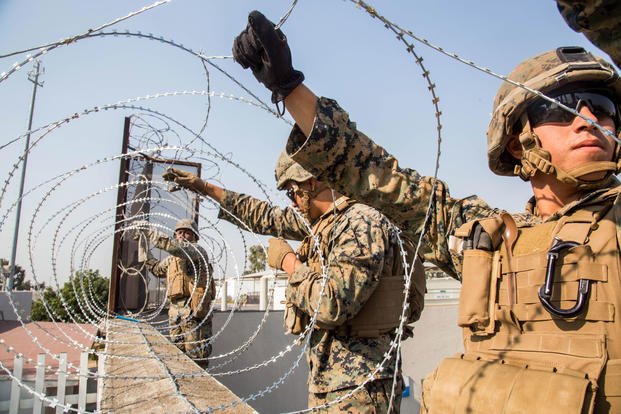The readiness rate for at least one Marine Corps unit is at risk of degrading after its troops were tasked with missions on the U.S.-Mexico border that fall outside their regular jobs, the service's top general said this week.
A small number of Marines were pulled from scheduled training exercises to support the Department of Homeland Security's mission on the southwest border, Commandant Gen. Robert Neller told lawmakers Tuesday. Thousands of troops have been deploying to the border for the last six months over what President Donald Trump has called an "invasion."
While the deployments have helped some -- such as pilots, military police and engineers -- improve their readiness rates, Neller said others could see their skills degrade.
"One particular unit is doing a mission today that's not part of their core competency," he said. "For 60 days, they can handle that, but it will affect their readiness."
Neller faced questions from members of the Senate Armed Services Committee about a pair of memos that leaked to the media about the effects border deployments are having on the service's readiness. Neller wrote the memos to the Navy secretary and acting defense secretary for help covering the cost of several unexpected bills -- including border deployments and storm damage -- he said are posing "unacceptable risk" to Marine Corps readiness.
"I wrote a memo to the secretary of the Navy laying out eight fiscal shortfalls the Marine Corps had, one of which was the cost of putting Marines on the border," he said.
Neller has denied leaking the memos, which Newsweek reported were given to a Los Angeles Times reporter so Marine Corps families at bases damaged by the hurricanes wouldn't be forgotten. Some have called for Neller to be ousted if he did leak the memos.
But Navy Secretary Richard V. Spencer, who was also testifying before the committee, said he requests memos like those Neller sent so he can understand where the services are being stressed. But he said the border deployments are not a major risk to readiness.
"This is item 'G' on the whole list," he said. " ... Five hundred men for a month at the southern border is $1.25 million so, in my mind, is that affecting my readiness stress? No, it's not."
In most cases, individual-level Marine units and squadrons aren't seeing their readiness affected by border deployments, Neller said. But the cost is one of several the Marine Corps is struggling to fund after hurricanes damaged several bases last year.
"What I was looking for was some assistance in trying to get money to reprogram because we have to pay our bills," he said. "Short of that, we'd have to look at other places to get the resources."
Members of Congress agreed last week to give the Marine Corps $400 million to start paying for repairs on family housing and other structures damaged during the storms. Neller called it a down payment on the $3.5 billion he says the service needs to fix everything.
Even if the cost of the border deployments totals a small fraction of that bill, Democratic Sen. Elizabeth Warren of Massachusetts said leaders must take notice if the commandant of the Marine Corps says the border missions could negatively affect readiness.
"I think it's time for the president and Congress to listen to him," she said.
-- Gina Harkins can be reached at gina.harkins@military.com. Follow her on Twitter @ginaaharkins.














